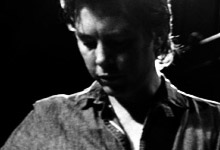
Tracks
Bill Callahan: "Riding for the Feeling"
(2011)
By Andrew Hall | 20 May 2011
After having lived with it for some time now, I’m fairly certain that Bill Callahan’s Apocalypse—unlike some of his previous work like Red Apple Falls (1997) or Sometimes I Wish We Were An Eagle (2009), which immediately struck me—is a record that I’m going to need to spend some serious time with before it fully clicks. I’d like to say I love it, but I don’t yet, and can only hope that I have an experience similar to the one I had with A River Ain’t Too Much to Love (2005), the brilliance of which slowly snuck up on me over years. I think “America!” has got some good jokes in it, but I don’t yet feel like I’ve even come close to parsing “Drover” or “One Fine Morning.”
Unlike its surroundings, however, “Riding for the Feeling” is stunning from the outset. Lindsay, in her review, called it “deeply felt,” and this is at least part of why it hits so hard. Callahan has described himself as someone who writes from the perspective of character-as-narrator, sometimes feeling as if he creates a new character to narrate each of his albums. However, this song, like a handful of others across his long and eccentric back catalogue—“Too Many Birds” immediately comes to mind, as do “To Be of Use” and “Left Only With Love”—sound like they’re breaking character not through any shift in lyrical style but solely through delivery. There’s a sense that Callahan has something to communicate in these moments that differs from what he does immediately before and after, and he really means it, and there’s a decent chance that this is in itself a put-on, and whether or not it’s a put on is essentially irrelevant when it resonates so well regardless.
Here, backed by a meditative, rolling arrangement built on an almost unchanging chord progression, stabs of electric guitar, and electric piano flourishes, Callahan sounds almost as if he struggles to maintain composure delivering just the song’s first and last lines, one ruminating on the act of saying goodbye and one questioning the goodbye that the song itself becomes. The pauses between fragments take on greater weight here, turning complete thoughts and sentiments into completely different ones through addition. “Don’t go, don’t go,” sung from the perspective of a marginally communicative audience and whatever desperation brought Callahan to this point, becomes a sentiment approachable from a dozen different ways without reading into it at all.
Yet as the words get less vicious and more contemplative—the only moment of real change here comes when the song shifts key briefly, and Callahan uses that to present the image of the touring musician in a hotel room, which he then calls his apocalypse—what’s left isn’t any clear, concrete meaning or answers to his questions, or even a straightforward collection of the singer’s thoughts on leaving before he himself leaves. Instead, there’s just one of the best and gentlest melodies he’s ever written, the kind of thing that could go on for six minutes or sixteen without losing any of its potency, and a point of entry more than welcome for both the uninitiated and enthusiastic but impatient.





